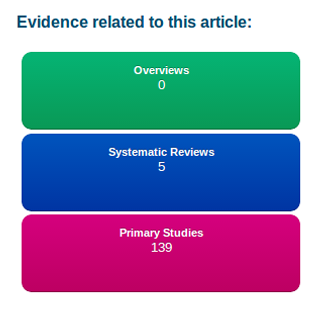PDQ (“pretty darn quick”)-Evidence facilitates rapid access to the best available evidence for decisions about health systems. It includes systematic reviews, broad syntheses of reviews (including evidence-based policy briefs), primary studies included in systematic reviews and structured summaries of that evidence.
The aim of PDQ-Evidence is to provide rapid access to systematic reviews of health systems evidence. A unique feature of PDQ-Evidence is that it links together systematic reviews, broad syntheses of reviews and primary studies, thus providing a highly efficient method for searching. In addition, it includes translations of the titles and abstracts of included records to facilitate searching in different languages and it is continually updated by searching multiple sources of systematic reviews and broad syntheses of reviews.
PDQ-Evidence is not a comprehensive database of health systems research. It only includes primary studies that have been included in a systematic review.
Additional articles can also be found by opening the abstract for relevant articles that are found and then clicking on one of the boxes on the right showing evidence related to the article. This will show the following connections:

Broad syntheses are linked to: other broad syntheses that include one or more of the same included systematic reviews; all of the included systematic reviews; any included primary studies.
Systematic reviews are linked to: broad syntheses that include the systematic review; other systematic reviews that include one or more of the same included primary studies; all the included primary studies.
Primary studies are linked to:broad syntheses that include the primary study, systematic reviews that include the primary studies, other primary studies included in the same systematic reviews.
We include systematic reviews and broad syntheses of systematic reviews that that address an explicit question about health systems, including:
We include systematic reviews and broad syntheses of systematic reviews of questions about health system problems, the effects of health system, barriers to and facilitators of those interventions, and the effects of implementation strategies.
We exclude systematic reviews and broad syntheses of systematic reviews that address clinical questions, including questions about the effects of clinical interventions, diagnostic tests, prognosis and aetiology.
Systematic reviews are summaries of research evidence that address a clearly formulated question using systematic and explicit methods to:
Systematic reviews of research evidence constitute a more appropriate source of research evidence for decision-making than the latest or most heavily publicized research study. Advantages of systematic reviews include:
Broad syntheses of reviews are summaries of systematic reviews that address broad questions using systematic methods to:
Evidence-based policy briefs bring together ‘global’ research evidence (from systematic reviews) and local evidence to inform deliberations about health policies and programmes
They begin with a policy problem and summarise the best available evidence to:
Advantages of evidence-based policy briefs include:
Primary studies in PDQ-Evidence include all of the studies that met the inclusion criteria for the systematic reviews in PDQ-Evidence.
The only limitations for inclusion of primary studies in PDQ-Evidence are those that were established by the review authors. We have not excluded studies based on publication status, language of publication, year of publication or study design beyond whatever exclusion criteria were used by the review authors.
Structured summaries of broad syntheses, systematic reviews and primary studies are prepared using standard headings and include critical appraisal and interpretation of the evidence that is summarised.
Typically these are prepared by someone other than the authors of the reports that are summarised and they contain more information than what is normally found in the abstracts written by the authors, which are also included in PDQ-Evidence.
Most of the technical developments rely on the software and collaborators of the Epistemonikos project. The search and identification of studies was partially funded by the European Commission’s 7th Framework Programme (Grant agreement no 222881) through the SURE project (Supporting the Use of Research Evidence for Policy in African Health Systems).. Additional support has come from the Norwegian Agency for Development Cooperation (Norad) and the Norwegian satellite of the Cochrane Effective Practice and Organisation of Care (EPOC) group.
The following people have contributed to the development of PDQ-Evidence:
PDQ-Evidence does not provide specific healthcare advice or recommendations, but rather information to inform health system decisions. We do not assume any legal liability or responsibility related to the use of this information.
We do not guarantee or assume any legal liability or responsibility for the accuracy, completeness or usefulness of any information that is found searching PDQ-Evidence.
We do not endorse or recommend any commercial products or services. The views and opinions of individual authors do not necessarily reflect those of PDQ-Evidence or the people behind PDQ-Evidence. The PDQ-Evidence name and logo may not be used for advertising or product endorsement purposes.